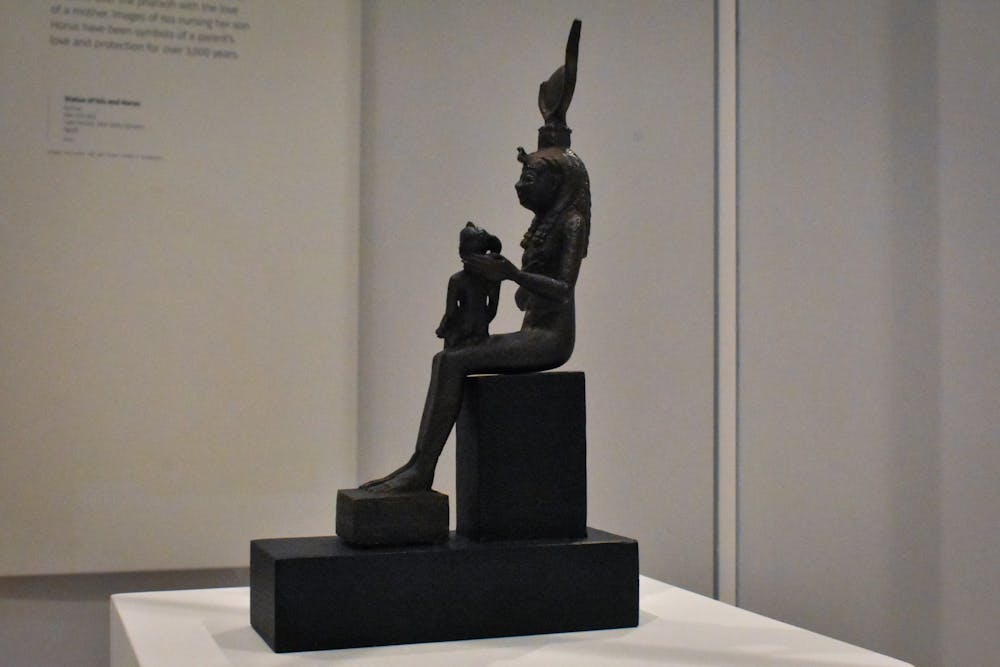
The public voted on a statue of Isis protecting her son, Horus, as the first artifact in the Penn Museum's Community Spotlight project.
Credit: Nicholas FernandezThe Penn Museum recently unveiled a new artifact to represent love, chosen entirely by the public.
The artifact was chosen as part of the Penn Museum's new Community Spotlight project, which invites the public to vote first on a universal theme, and then on an artifact to represent the chosen theme. The artifact is then put on display in the Spotlight Gallery, an exhibit adjacent to the Sphinx.
In March, the public chose love as the theme for the artifact. Penn Museum staff then selected six potential artifacts to represent the theme, which were put to a vote. A bronze statue of the Egyptian goddess Isis protecting her son Horus was chosen as the winning statue and was unveiled in the exhibit on Oct. 10.
A series of major renovations over the past few years produced a new keyhole-shaped gallery space near the entrance. When the museum Main Entrance Gallery reopened in Nov. 2019, it initially displayed a pair of moccasins. But museum staff said they saw an opportunity to give the community a say in picking the display’s artifacts, and the pandemic motivated them to launch the new project.
“When March rolled around and everything in our world changed, I think we looked for ways to community-build as best we could in the situations we found ourselves in,” Jennifer Houser Wegner, Associate Curator of the Egyptian Section at the Penn Museum, said.
When the first round of votes was tabulated, love won out against five other themes encompassing a range of human emotions, including more negative words such as envy and heartbreak. Wegner attributed the victory to positivity’s crucial role in challenging times.
“We all felt the need for human connection and positive thoughts,” said Wegner.
For the second round, Museum collection staff selected objects they felt best embodied love. The community voted again, this time on a set of six artifacts representing several types of love – including romantic, religious, and parental – and the statuette of Isis and Horus prevailed.
Wegner, a 1991 College graduate whose time with the Museum began with her undergraduate work-study job, selected the statuette as a candidate because of its powerful story of maternal love. In Egyptian mythology, Isis’ husband was murdered by his brother, Set. She was forced to flee to the Nile Delta to raise her son, Horus, protecting him at every turn from Set’s evil plans.
As the mother of a 17-year-old, Wegner connected with this maternal love on a personal level. She believes the chaotic nature of the present has strengthened the instinctual urge to keep loved ones safe.
“I think this idea of parental love for a child is something that transcends time and place,” she said. “That motherly feeling has kicked into overdrive. So I guess I can identify with Isis’s desire to protect her child at all costs.”
Wegner noted that many depictions of Isis protecting or nursing Horus have been uncovered. This is likely because Ancient Egyptians with a connection to Isis and motherhood purchased and dedicated the statues at temples, in an attempt to ensure their prayers to the goddess were heard.
Public voting for the Community Spotlight program was one of many virtual programs that the Museum developed in response to the COVID-19 pandemic. The Penn Museum at Home initiative included increased social media programming, a monthly book club, and the “Living Room Lecture” series. Jess Bicknell, Head of Exhibits, emphasized the importance of connecting with the Penn community remotely.
“This idea of engaging with people on social media channels and the idea of universal connection only became more important,” Bicknell said.
Encouraged by the high level of engagement – hundreds of people voted for the themes and objects – Bicknell plans to continue the Community Spotlight as an ongoing series in the future, and encouraged those interested to “stay tuned.”
The Daily Pennsylvanian is an independent, student-run newspaper. Please consider making a donation to support the coverage that shapes the University. Your generosity ensures a future of strong journalism at Penn.
Donate



